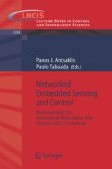Search
Search Results
-
The Four–Dimensional Spacetime
Physics theories are made by building mathematical models that correspond to physical systems. General Relativity, the physical theory of...
-
Boundary Conditions
Most Numerical Relativity simulations are devised to approximate the time evolution of the dynamical fields starting from data given on an initial...
-
Homogeneous Semantics Preserving Deployments of Heterogeneous Networks of Embedded Systems
Tagged systems provide a denotational semantics for embedded systems. A heterogeneous network of embedded systems can be modeled mathematically by a...
-
Distributed Kalman Filtering and Sensor Fusion in Sensor Networks
The problem of distributed Kalman filtering (DKF) for sensor networks is one of the most fundamental distributed estimation problems for scalable...
-
Applications of Connectivity Graph Processes in Networked Sensing and Control
This paper concerns the problem of controlling mobile nodes in a network in such a way that the resulting graph-encoding of the inter-node...
-
Delay-Reliability Tradeoffs in Wireless Networked Control Systems
Networked control systems (NCS) require the data to be communicated timely and reliably. However, random transmission errors incurred by wireless...
-
Plenary Talk: The Role of Information Theory in Communication Constrained Control Systems
Communication is an important component of distributed, networked, and cooperative control systems. In most current systems the communication aspects...
-
Simulation of Large-Scale Networked Control Systems Using GTSNetS
This paper presents a simulation framework for distributed control using wireless sensor networks. The proposed framework is an extension of the...
-
Belief Consensus and Distributed Hypothesis Testing in Sensor Networks
In this paper, we address distributed hypothesis testing (DHT) in sensor networks and Bayesian networks using the average-consensus algorithm of...
-
Plenary Talk Network-Embedded Sensing and Control: Applications and Application Requirements
The first part of my talk will cover some recent commercially successful applications of networked and embedded sensing and control solutions. These...
-
Plenary Talk: Delays in Control over Communication Networks: Characterization, Impact, and Reduction Strategies
The most notable trend in manufacturing over the past five years is probably the move towards networks at all levels of industrial systems. At lower...
-
Disturbance Attenuation Bounds in the Presence of a Remote Preview
We study the fundamental limits of disturbance attenuation of a networked control scheme, where a remote preview of the disturbance is available. The...
-
Robust Controller Design for AQM and $\mathcal{H}^{\infty}$ -Performance Analysis
Active Queue Management (AQM) has recently been proposed in [1] to support the end-to-end congestion control for TCP traffic regulation on the...
-
Control of Communication Networks Using Infinitesimal Perturbation Analysis of Stochastic Fluid Models
Managing and operating large scale communication networks is a challenging task and it is only expected to get worse as networks grow larger. The...
-
State-Space Models for Control and Identification
In the last two decades, design and performance evaluation of efficient congestion control methods for packet-switching computer communication...
-
Position and Force Tracking in Bilateral Teleoperation
A teleoperator is a dual robot system in which a remote slave robot tracks the motion of a master robot, which is, in turn, commanded by a human...
-
Critical Phenomena in a Small World
We consider the behavior of various systems on a small-world network near a critical point. Our starting point is a different, nonrandom system with...
-
Who Is the Best Connected Scientist?A Study of Scientific Coauthorship Networks
Using data from computer databases of scientific papers in physics, biomedical research, and computer science, we have constructed networks of...
-
Scholarly Information Network
I review the background and some recent trends of a particular scholarly information network, ar**v.org, and discuss some of its implications for new...
-
Information Theory of Complex Networks: On Evolution and Architectural Constraints
Complex networks are characterized by highly heterogeneous distributions of links, often pervading the presence of key properties such as robustness...
